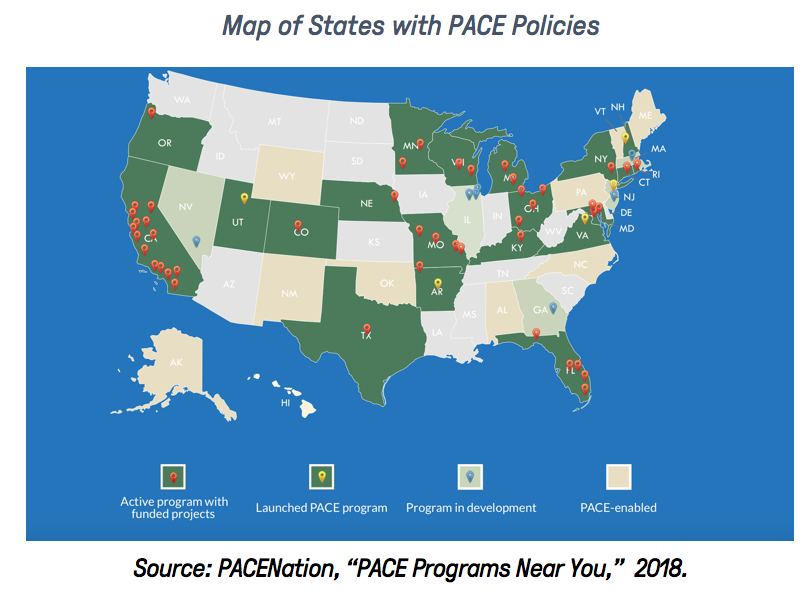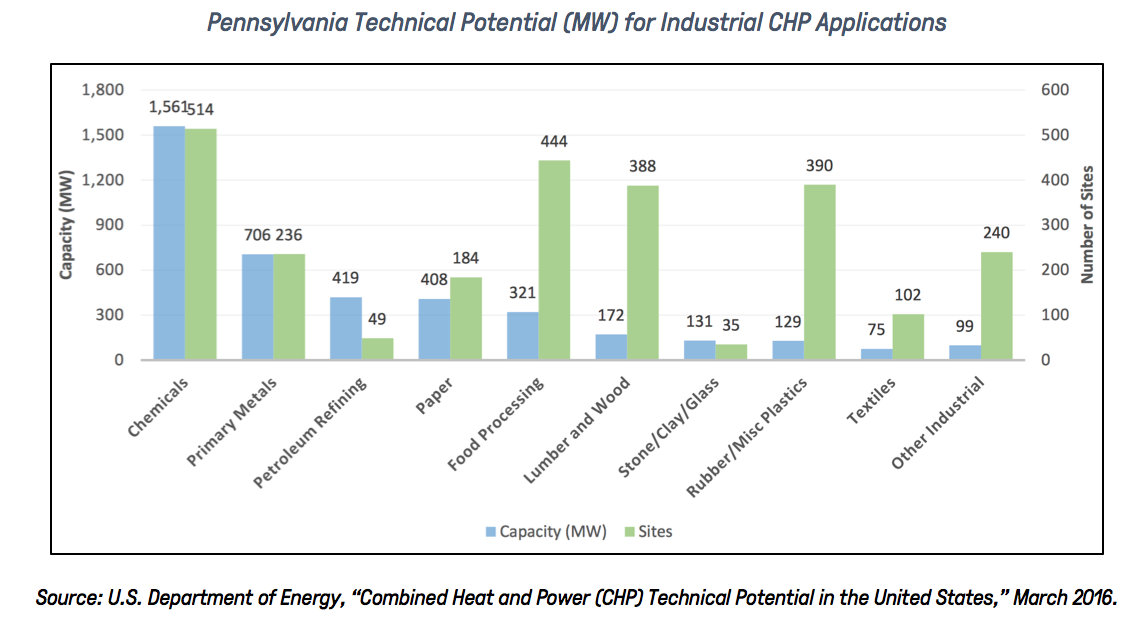By John Vaughn, summer intern at David Gardiner and Associates
In June, Governor Tom Wolf signed a bipartisan bill (SB 234) that allows for Property Assessed Clean Energy (PACE) financing in Pennsylvania. Pennsylvania is the 34th state to authorize PACE financing, joining states such as Ohio, Texas, and Connecticut.
 PACE is a low-cost, long-term financing solution that enables the hosts of energy efficiency and renewable energy projects to pay for these investments through the savings on their energy bills. PACE pays for 100 percent of a project’s costs over a period of up to 20 years through an assessment added to the property’s tax bill. PACE financing also allows municipalities to partner with private lenders to raise capital for projects. Once PACE financing is authorized in a state, cities and towns are free to set local guidelines, tailoring PACE to fit their needs and the needs of local business owners. This structure promotes local involvement and ensures that local programs reflect local interests.
PACE is a low-cost, long-term financing solution that enables the hosts of energy efficiency and renewable energy projects to pay for these investments through the savings on their energy bills. PACE pays for 100 percent of a project’s costs over a period of up to 20 years through an assessment added to the property’s tax bill. PACE financing also allows municipalities to partner with private lenders to raise capital for projects. Once PACE financing is authorized in a state, cities and towns are free to set local guidelines, tailoring PACE to fit their needs and the needs of local business owners. This structure promotes local involvement and ensures that local programs reflect local interests.
PACE financing can be used to fund combined heat and power (CHP) projects and other energy efficiency investments. CHP is an energy-efficient way for buildings to generate both thermal energy and electricity on site. According to the EPA, A CHP system runs at around 75 percent efficiency, compared to the average 50 percent efficiency of a conventional system. CHP provides a solution for companies and facilities that require both on-site power and thermal energy, while also increasing efficiency, lowering costs, and reducing emissions.
Despite these benefits of CHP systems, high upfront costs have historically discouraged large-scale deployment. PACE provides an innovative way to finance these projects and could help grow the technology. Pennsylvania’s new PACE bill opens up these opportunities.
PACE has been used to finance CHP projects in other states. For example, the YMCA in Meriden, Connecticut saved energy and lowered operating costs by installing a 60-kilowatt CHP system that will save the facility will save around $40,000 annually and allows for a more efficient way of providing hot water and pool heating. The system was installed by Tecogen with financing help from Connecticut’s Commercial and Industrial PACE program. The YMCA was a particularly good candidate for CHP because of its high year-round demand for hot water.
PACE has also been used to finance a variety of other energy efficiency projects. The newly constructed home of D.C. United, Audi Field, received $25 million in PACE financing. The new stadium was able to finance a variety of energy efficiency measures including an 884-kW solar system, high efficiency HVAC systems, a green roof, and LED field lighting. In Chesterfield, Missouri, Cambridge Engineering used $610,500 of PACE Financing to improve its headquarters. The PACE financing was put towards renovations such as roof replacement, air conditioning renovations, and air volume distribution system upgrades. The financing plan has a term of 10 years and Cambridge Engineering expects to see energy savings of 30% and utility savings of $.37/sf. The city of Chesterfield is a part of an energy improvement district within the state, providing PACE financing which is then administered through the Missouri Energy Initiative Without PACE financing and the assistance of Chesterfield’s local realtionship with PACE financing, these renovations and energy savings would not have been possible.
Pennsylvania is no stranger to CHP. According to data from the Department of Energy (DOE), Pennsylvania has 2,938 MW in existing CHP generation. But the potential is far greater. A 2016 DOE study ranks Pennsylvania 4th nationwide for potential deployment. The chemical, primary meta, and petroleum refining sectors have the highest potential CHP generation (see Figure 2). The chemicals sector alone could add 1,561 MW at just over 500 sites throughout the state. Organizations like the Mid-Atlantic CHP Technical Assistance Partnership (CHP TAP), housed at Pennsylvania State University’s School of Engineering can help potential hosts identify opportunities and financing options. Thanks to SB 234, Pennsylvania businesses now have an additional tool to help fund these projects
As Governor Wolf declared upon signing the new law, “This innovative financing mechanism will support the creation of new clean energy and energy efficiency projects throughout the commonwealth, while also enhancing property values and employment opportunities, while lowering the costs of doing business.” Indeed, Pennsylvania is in a great position to expand the deployment of CHP and increase energy efficiency while providing jobs in the design, installation, and maintenance of these systems. The new availability of PACE financing can help more of these projects become a reality.

